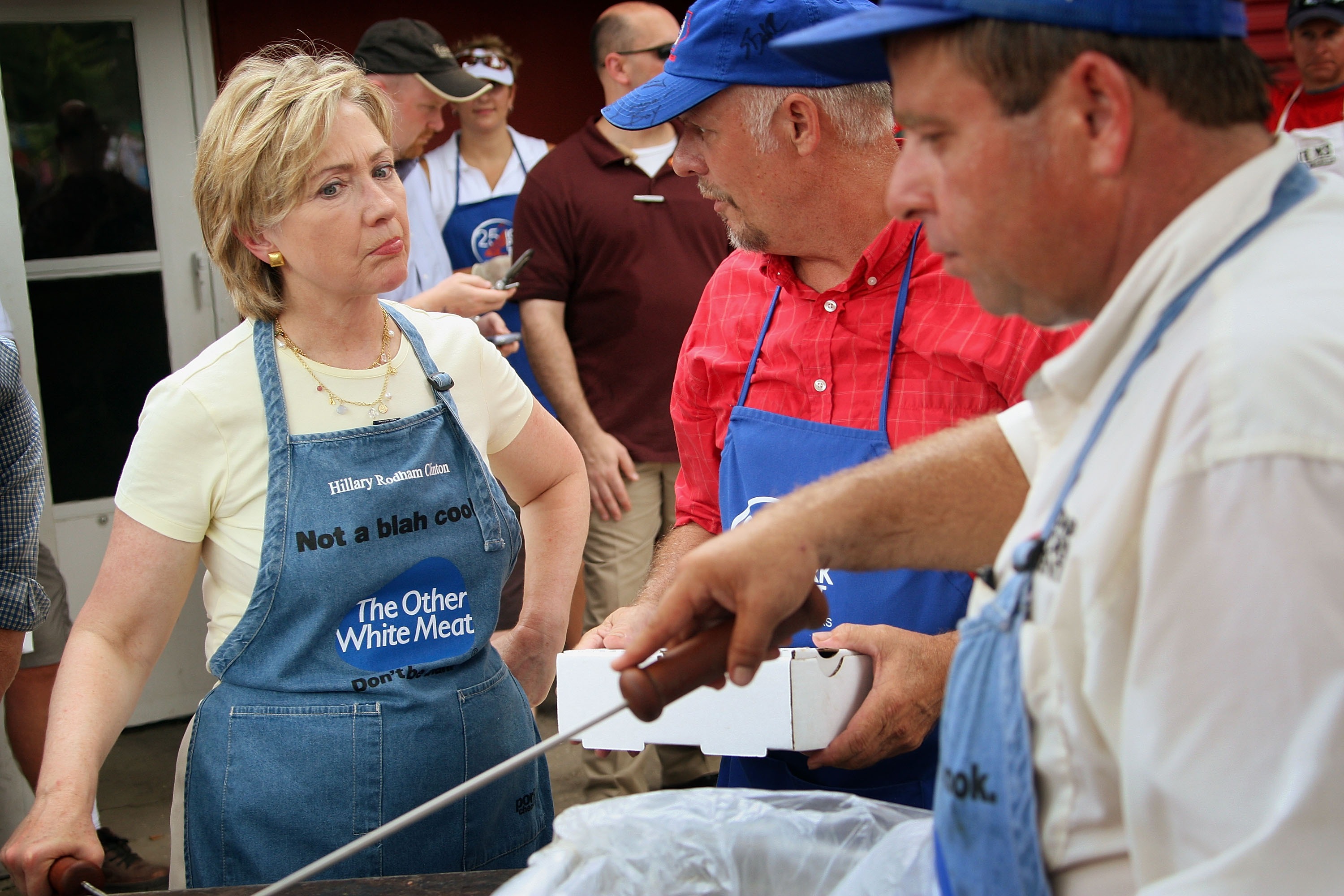Dear 2016: Stop using middle America as a feel-good political prop
We Midwesterners deserve better!


A free daily email with the biggest news stories of the day – and the best features from TheWeek.com
You are now subscribed
Your newsletter sign-up was successful
After officially launching her presidential campaign on Sunday, Hillary Clinton hopped in a van and headed straight for Iowa. There, she told four students, three educators, and a battalion of reporters that she wanted to be "the champion who goes to bat for Americans." She added that "we need to strengthen families and communities because that's where it all starts."
Those are perfectly fine sentiments. And they're certainly no more insincere than the thousands of other platitudinous wisps we're about to hear from 2016 candidates of both parties. But if there was anything more inevitable than Hillary Clinton running for president, it was that she and the rest of the candidates — Democrats and Republicans alike — would drape themselves in those faux-folksy statements and take their most down-home selves to middle America.
As the site of America's first-in-the-nation caucus, Iowa is a special case. But it's hardly the only "heartland" spot where the Beltway elite will try to show off their "everyday American" sympathies. They go to Ohio and Illinois and Nebraska and Wisconsin. They go to state fairs featuring red-white-and-blue bunting — perfect backdrops for photo ops with babies, fried foods of all ilk, and plenty of rolled-up shirtsleeves that say, "Hey, I know how to have a good, wholesome time, too." Yes, the Midwest is full of electorally important states. But when it comes to presidential campaigning, the biggest appeal of middle America has long been for its use as a feel-good political prop — something candidates use to make themselves seem approachable, relatable, and of course, electable.
The Week
Escape your echo chamber. Get the facts behind the news, plus analysis from multiple perspectives.

Sign up for The Week's Free Newsletters
From our morning news briefing to a weekly Good News Newsletter, get the best of The Week delivered directly to your inbox.
From our morning news briefing to a weekly Good News Newsletter, get the best of The Week delivered directly to your inbox.
Look, we all know that American political campaigns are cynical, highly scripted, sharp-elbowed scrambles for power. Strategists get paid a lot of money to figure out how and where to cast their bosses in the best possible light. Often the answer is the Midwest. But perhaps nowhere does this move feel more hypocritical.
Why? First off, because middle Americans already feel used by national political candidates. Many Midwesterners — those actually living in small towns and on farms and not merely posing for photographs before driving back to the nearest city — look at parachuting-into-town candidates and see astonishingly ambitious career politicians who, if elected, will rarely set foot back in their state or a neighboring one, unless it's to finish off a 50-state bucket list.
President Obama's upcoming visit to South Dakota — the last state he has not visited as president — is a perfect example. South Dakota is "sparsely populated and electorally noncompetitive," Brendan Doherty, a U.S. Naval Academy political science professor and author of The Rise of the President's Permanent Campaign, told Time. And yet, candidate Barack Obama made several 2008 campaign stops in South Dakota — the Corn Palace in Mitchell and the W.H. Lyon Fairgrounds in Sioux Falls among them. Getting back as President Obama has taken nearly two terms in office.
Here's another problem: Presidential campaigns hold up the heartland in a gauzy, squishy, hyper-idealistic way that is inaccurate to the extreme.
A free daily email with the biggest news stories of the day – and the best features from TheWeek.com
I hail from a relatively small town in central Illinois: Mattoon, population 18,368. Let me be clear: We Midwesterners don't all value the simple life of hard work and faith and family and county fairs and diners and farming and mom-and-pop stores. Some of us do! And there are good reasons to aspire to those ideals. But using our homes and lives in this extraordinarily broad way to advance your own political career is insulting. Pandering to an assumed base of gun-loving, Republican Christians in the Midwest feels just as presumptuous as assuming "urban areas" will vote only for Democrats. I know an awful lot of folks from my hometown who voted for Barack Obama and also happen to enjoy hunting. We all make up multitudes.
Praising middle America is often how politicians let themselves off the hook of hearing out the problems affecting Midwesterners once elected, too. Take President Obama's frequent visits to city high schools and middle schools, where he touts his education reform goals and talks about the need for inner-city students to have access to the better schools so geographically close but educationally far away. He's right. But what about the Midwest students who attend the only high school for 30 miles in any direction? It's a tougher trip, a less obvious photo op. But the chances of those students landing anywhere other than the local community college feel as frustratingly palpable to them and their parents as their big-city counterparts.
How the issues play out is often different depending on the state you're in, whether it's a suburb or a city or a rural town in Illinois. But the issues are issues for a reason: They exist in a lot of places, through a lot of lenses, across the entire country. And Midwesterners deserve to be a part of the conversation for longer than a campaign cycle, and for more reason than the poll boost that comes from posing with people who wear Carhartt unironically. We're more than that. Treat us that way.
Sarah Eberspacher is an associate editor at TheWeek.com. She has previously worked as a sports reporter at The Livingston County Daily Press & Argus and The Arizona Republic. She graduated from Northwestern University's Medill School of Journalism.
-
 Film reviews: ‘Send Help’ and ‘Private Life’
Film reviews: ‘Send Help’ and ‘Private Life’Feature An office doormat is stranded alone with her awful boss and a frazzled therapist turns amateur murder investigator
-
 Movies to watch in February
Movies to watch in Februarythe week recommends Time travelers, multiverse hoppers and an Iraqi parable highlight this month’s offerings during the depths of winter
-
 ICE’s facial scanning is the tip of the surveillance iceberg
ICE’s facial scanning is the tip of the surveillance icebergIN THE SPOTLIGHT Federal troops are increasingly turning to high-tech tracking tools that push the boundaries of personal privacy
-
 The billionaires’ wealth tax: a catastrophe for California?
The billionaires’ wealth tax: a catastrophe for California?Talking Point Peter Thiel and Larry Page preparing to change state residency
-
 Bari Weiss’ ‘60 Minutes’ scandal is about more than one report
Bari Weiss’ ‘60 Minutes’ scandal is about more than one reportIN THE SPOTLIGHT By blocking an approved segment on a controversial prison holding US deportees in El Salvador, the editor-in-chief of CBS News has become the main story
-
 Has Zohran Mamdani shown the Democrats how to win again?
Has Zohran Mamdani shown the Democrats how to win again?Today’s Big Question New York City mayoral election touted as victory for left-wing populists but moderate centrist wins elsewhere present more complex path for Democratic Party
-
 Millions turn out for anti-Trump ‘No Kings’ rallies
Millions turn out for anti-Trump ‘No Kings’ ralliesSpeed Read An estimated 7 million people participated, 2 million more than at the first ‘No Kings’ protest in June
-
 Ghislaine Maxwell: angling for a Trump pardon
Ghislaine Maxwell: angling for a Trump pardonTalking Point Convicted sex trafficker's testimony could shed new light on president's links to Jeffrey Epstein
-
 The last words and final moments of 40 presidents
The last words and final moments of 40 presidentsThe Explainer Some are eloquent quotes worthy of the holders of the highest office in the nation, and others... aren't
-
 The JFK files: the truth at last?
The JFK files: the truth at last?In The Spotlight More than 64,000 previously classified documents relating the 1963 assassination of John F. Kennedy have been released by the Trump administration
-
 'Seriously, not literally': how should the world take Donald Trump?
'Seriously, not literally': how should the world take Donald Trump?Today's big question White House rhetoric and reality look likely to become increasingly blurred
